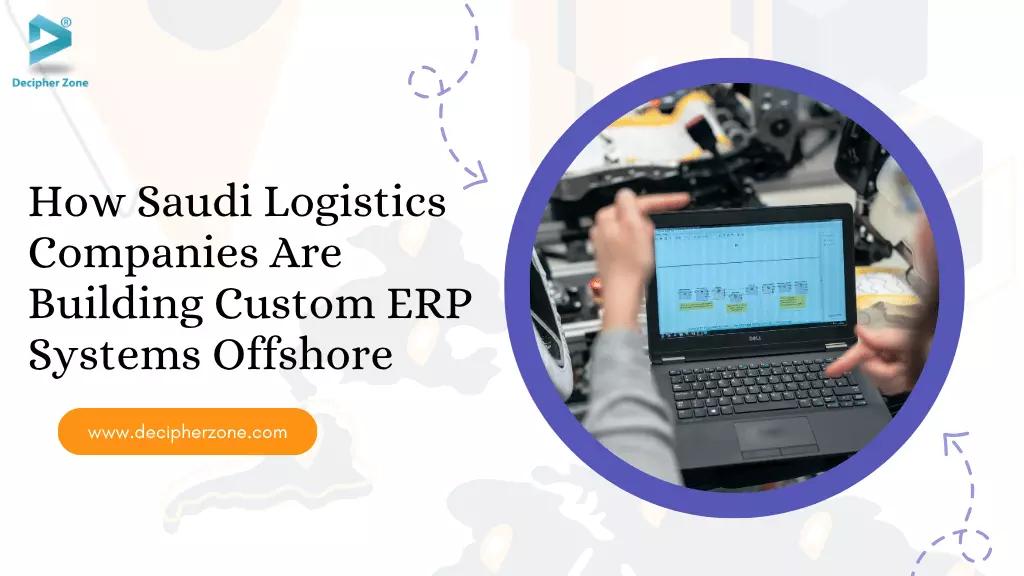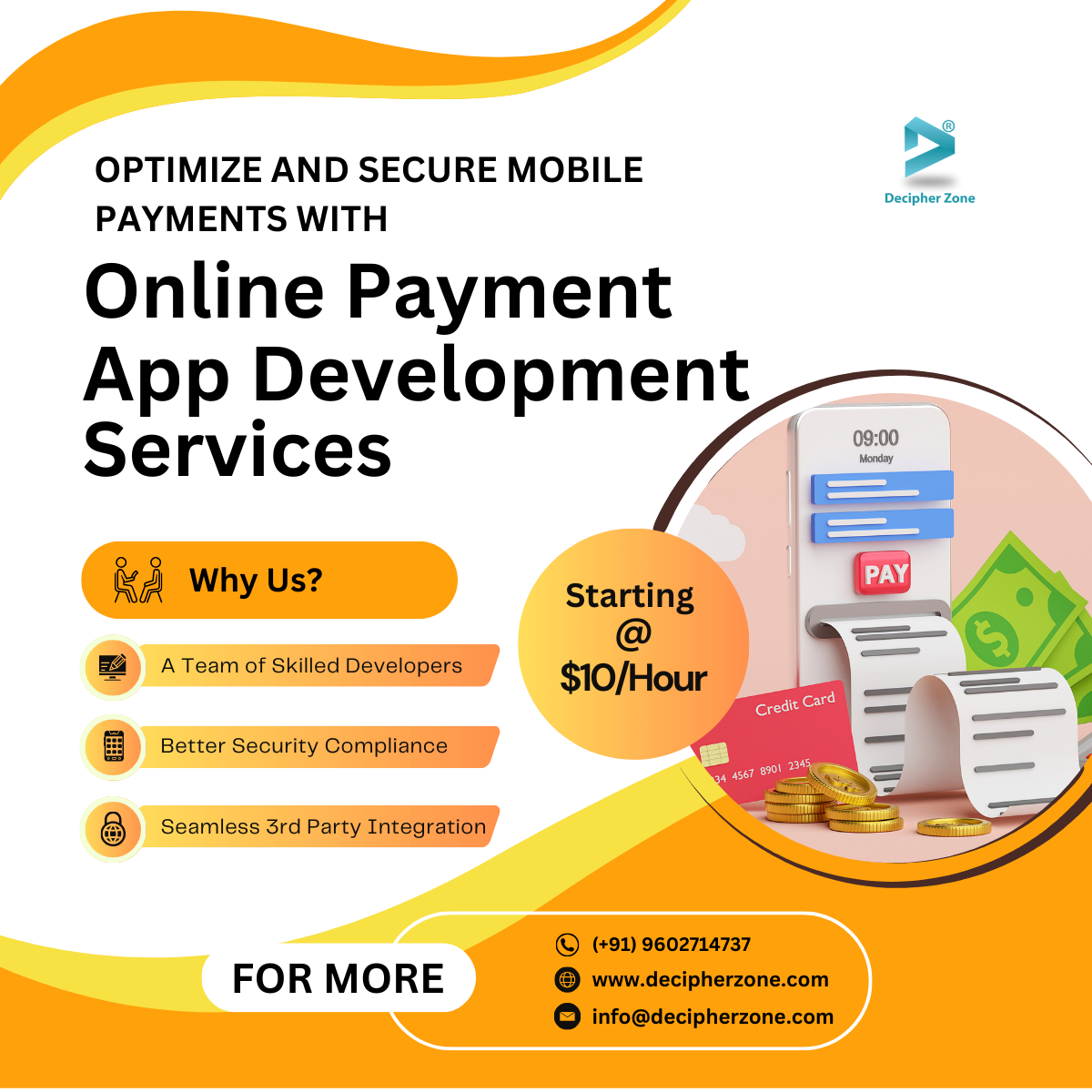Saudi Arabia’s logistics sector is under pressure to modernize, and many firms are turning to offshore developers for custom ERP systems. By outsourcing ERP development to experienced offshore teams (often in India), Saudi logistics companies can save 40–60% on costs while getting high-quality, tailored software solutions. This strategy accelerates digital transformation – delivering real-time tracking, streamlined operations, and better ROI for logistics providers facing rising demand and competition.
Why Logistics Companies in Saudi Arabia Need Custom ERP
Saudi Arabia’s logistics sector is booming under initiatives like Vision 2030, which aims to make the Kingdom a global logistics hub. With the market valued at $136.3 billion in 2024 and projected to reach nearly $199 billion by 2030, local logistics firms face intense demand for efficiency and real-time operations.
Read: software development
Legacy systems and off-the-shelf ERPs often struggle to keep up with this growth. They can be slow to adapt, expensive to modify, and hard to scale for new e-commerce and delivery needs. As a result, there are critical gaps in functionality – from lack of advanced fleet tracking to limited support for local processes.
Modern customers and partners expect live tracking of shipments, instant inventory updates, and data-driven decision making. Real-time coordination between warehouses, transport fleets, and distribution centers is now essential. Standard ERPs might offer basic tracking, but they often require heavy customization to deliver true end-to-end visibility.
In short, the convergence of legacy challenges, off-the-shelf software gaps, and rising demand for real-time logistics is driving Saudi companies to seek custom ERP solutions built to their needs.
Read: Introduction to Enterprise Resource Planning (ERP)
Why Offshore ERP Development Is Gaining Popularity in Saudi Arabia
Building a custom ERP in-house or with local firms in Saudi Arabia can be prohibitively expensive and time-consuming. This is why many Saudi logistics companies are increasingly turning to offshore development (often in tech hubs like India or Eastern Europe) to create their ERP systems.
The cost-effectiveness is a major draw. On-site development in Saudi can cost up to 60% more than offshore development. For example, mid-level developers in India might charge $20–$35/hour, whereas local Saudi developers cost roughly $35–$60/hour.
By offshoring, a logistics firm can save substantially on labor costs while still getting quality work – often reducing the ERP project budget by nearly half.
Beyond cost, faster development cycles are another advantage. Offshore partners often have large, readily available talent pools. They can assemble a full development team quickly and even work in extended time windows to accelerate progress.
With a modest time zone difference (India is only 2–3 hours ahead of Saudi Arabia), Saudi companies can maintain close to real-time communication while enjoying some round-the-clock productivity.
Many offshore teams also provide 24/7 support, leveraging global time zones to ensure any issues are resolved promptly. This around-the-clock capability means faster iterations and quicker project completion.
Crucially, offshoring gives Saudi companies access to specialized logistics software talent that may be scarce locally. Saudi Arabia is experiencing a tech talent crunch – roles like cloud architects, SAP/ERP consultants, and data engineers are in high demand, but local expertise remains limited (some estimates show a 40% shortfall in certain ERP skills).
Offshore development firms, especially in India, have extensive experience building logistics and supply chain systems for clients worldwide. They bring domain know-how in fleet management, route optimization, inventory systems, and more.
This deep expertise allows them to deliver robust solutions faster and with fewer mistakes. In fact, improved access to talent has become an even bigger motivator for outsourcing than cost savings for many companies.
Lastly, the offshore model offers flexibility that local development often cannot. Companies can scale the development team up or down as needed, tap into niche skills (e.g. IoT integration or AI algorithm experts) on demand, and avoid long local hiring cycles.
With 80% of executives worldwide planning to maintain or increase their use of third-party outsourcing, it’s clear that offshoring is now a mainstream strategy.
For Saudi logistics firms eager to implement custom ERP solutions without breaking budgets or delaying projects, offshore development provides the ideal mix of affordability, speed, and specialized skill.
🚀 Ready to Build a Custom ERP for Your Logistics Operations?
Unlock 40–60% cost savings with offshore development from Decipher Zone.
👉 Explore ERP Development Services
Key Benefits of Offshore ERP Development for Saudi Logistics Companies
Choosing an offshore development model for building a custom ERP comes with several compelling benefits for logistics companies:
1. Full Customization Freedom
Offshore development teams will build the ERP to your exact specifications. You aren’t constrained by the limited configurations of a pre-made software. Every module, workflow, and report can be tailored to match your business processes.
This means a better fit to your operations and no unnecessary bloat. You can implement unique features (for example, a module for camel convoy tracking if your logistics needs it!) that no off-the-shelf product would offer. The result is an ERP that works the way you work, rather than forcing you to adapt to the software.
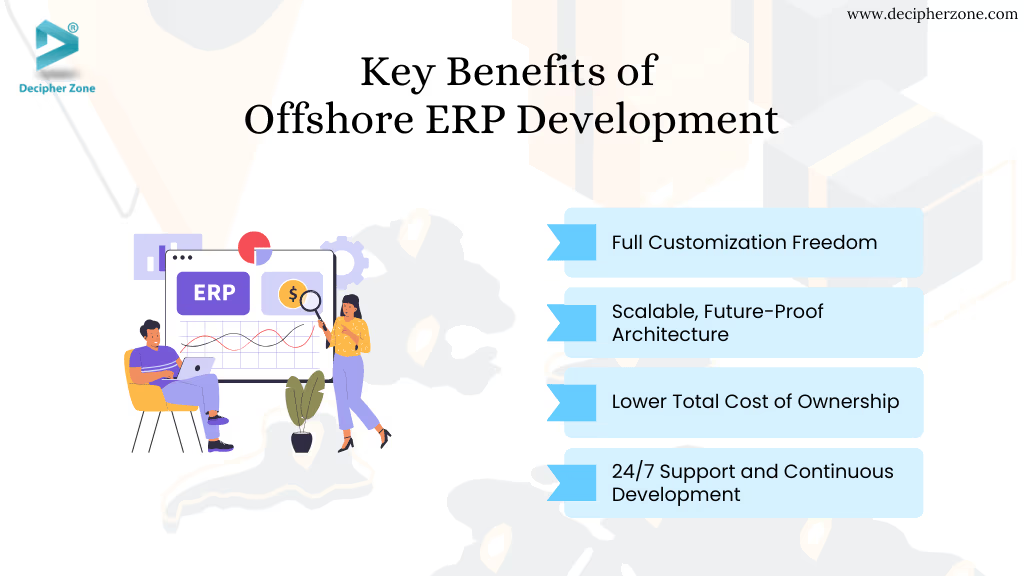
2. Scalable, Future-Proof Architecture
Offshore developers can design the system with modern, scalable architectures (microservices, cloud-native infrastructure, etc.). As your logistics business grows – adding more warehouses, routes, or users – the ERP can scale up easily without performance issues.
Additionally, a custom-built system can be more readily extended with new features or emerging technologies. You own the source code, so integrating an AI engine or new IoT sensor data down the line is feasible. This scalability and flexibility protects your investment long-term, unlike rigid proprietary systems that might become obsolete or costly to upgrade.
3. Lower Total Cost of Ownership (TCO)
Beyond the initial development cost savings, offshoring often reduces the ongoing costs of maintaining and running the ERP. There are no hefty licensing fees that come with commercial ERP products.
Support and maintenance can be contracted at affordable offshore rates. Many offshore providers also offer post-launch maintenance packages that are more economical. Additionally, by streamlining operations, a well-built ERP reduces operational expenses.
For instance, automating manual tasks and optimizing routes (with ERP data) cuts labor and fuel costs. These efficiency gains translate to a lower TCO over the system’s life. Studies show offshore development can yield 30–70% cost savings in labor alone, which significantly benefits the bottom line.
4. 24/7 Support and Continuous Development
With an offshore partner, you can often arrange for round-the-clock support. This is especially valuable for logistics operations that run 24/7. If something goes wrong in the ERP at 2 AM, an offshore support team in a different time zone can start fixing it immediately.
“Most offshore teams provide 24/7 IT maintenance support, ensuring issues are resolved promptly,” as one consulting firm notes. Furthermore, the development doesn’t stop at go-live.
You can keep a small offshore team on retainer to continuously improve the ERP, add features, and respond to new requirements (like changes in Saudi regulations or business expansions). This continuous improvement model means your software is always evolving and never stagnates.
📈 Streamline Fleet, Warehouse, and Supply Chain With a Tailored ERP System
Let’s transform your logistics business with end-to-end automation and real-time tracking.
👉 Talk to Our ERP Experts Today
Read: Benefits of ERP Software Development
Onshore vs Offshore ERP Development: Cost & ROI Comparison
When a Saudi logistics firm decides to implement a custom ERP, they face a fundamental choice: develop it locally (onshore) or hire an offshore development team. Both approaches can deliver a working system, but the costs, time-to-market, and ROI can differ dramatically.
Below is a comparison of onshore vs. offshore ERP development for a mid-sized logistics project:
|
Cost Factor |
Onshore Development (Saudi) |
Offshore Development (e.g. India) |
|
Average Developer Hourly Rate |
$50–$100 (or SAR 185–370/hour) – high local salaries |
$20–$40/hour – significantly lower rates in Asia |
|
Team Monthly Cost (5 developers) |
~$40,000 (including benefits, office overhead) |
~$15,000 – $20,000 (offshore vendor covers overhead) |
|
Total ERP Project Cost (est. 2000 hours) |
SAR 750k–1,500k (approx $200k–$400k) |
SAR 300k–600k (approx $80k–$160k) – ~50% lower cost |
|
Time to Hire/Scale Team |
Slow – local hiring can take months; limited talent pool |
Fast – vendors can deploy ready teams in weeks, scalable on-demand |
|
Quality & Expertise |
Strong, but niche expertise (e.g. IoT integration) may be scarce locally |
High – access to global specialists (India alone has ~5.8M developers) |
|
Hidden Costs |
Higher overhead: office space, equipment, employment taxes, and expat visas for foreign experts |
Lower overhead: offshore partner handles infrastructure and HR; Saudi firm avoids local bureaucracy |
|
Project ROI |
Modest – High upfront cost means a longer payback period |
Higher – Lower cost means faster return on investment (savings ~40–60% on development can be reinvested) |
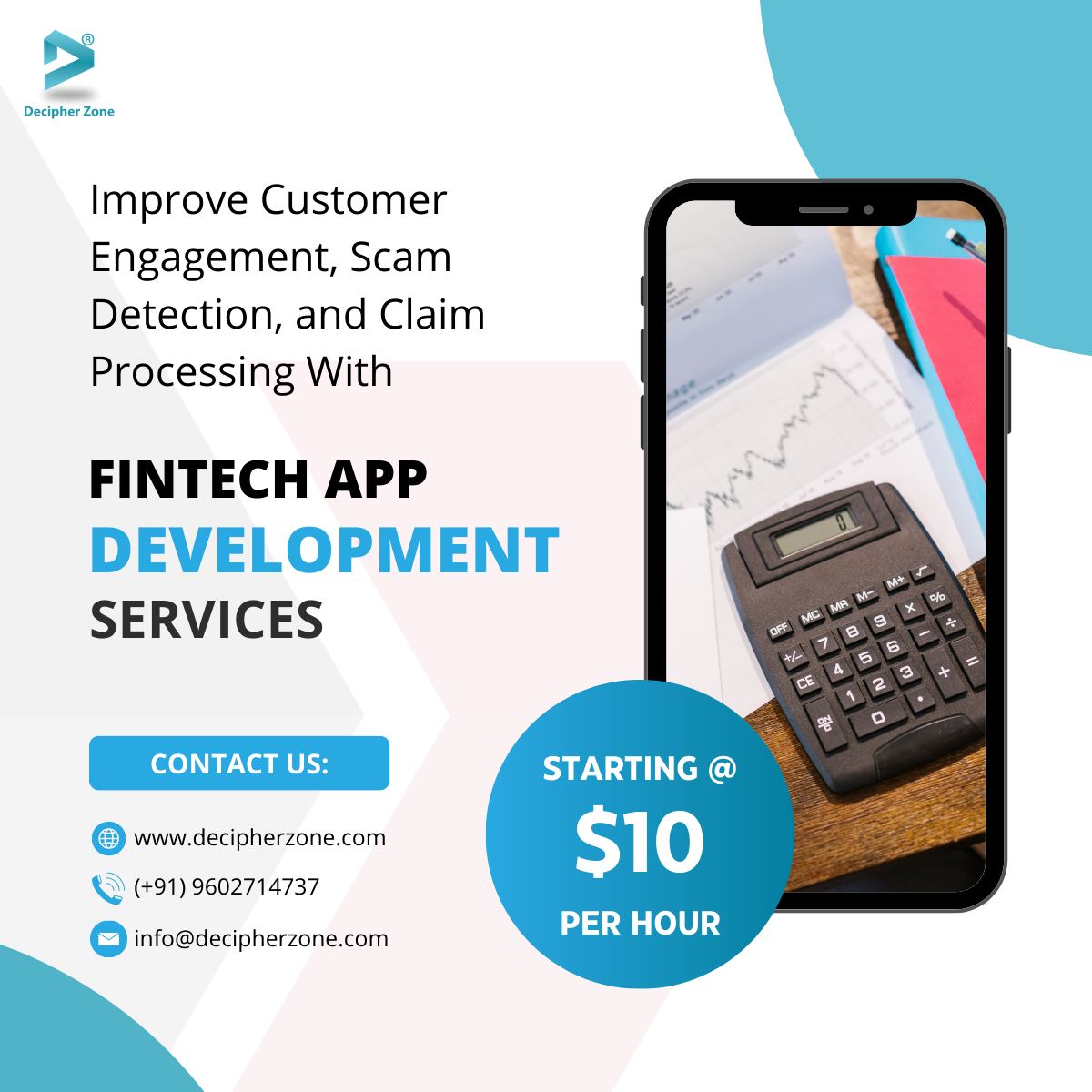
Solving Saudi Supply Chain Challenges with Custom ERP Development
Every country’s logistics sector has its quirks, and Saudi Arabia is no exception. From harsh desert geography to stringent local regulations, Saudi logistics companies face unique challenges. Custom ERP systems can be designed to directly tackle these pain points in ways off-the-shelf software often cannot.
Here are some industry-specific problems in the Saudi supply chain and how a tailored ERP helps solve them:
1. Port Delays and Customs Clearance
Saudi Arabia’s ports (like Jeddah, Dammam) are bustling gateways, but shipments can be held up by complex customs procedures or documentation errors. A custom ERP can integrate customs brokerage workflows and digital documentation to expedite clearance.
For example, the ERP can auto-fill Saudi Customs forms with data from purchase orders, ensure all required certificates are attached, and track each container’s clearance status.
By providing a single window for customs compliance, the ERP reduces delays. Moreover, as regulations change, the custom system can be updated quickly. This addresses the “complex navigation of customs and regulatory framework” which industry experts cite as a top challenge in Saudi logistics.
2. Warehouse Mismanagement and Inventory Errors
Many logistics providers operate large warehouses (for 3PL or as distribution centers). In the past, manual processes led to misplaced stock and slow fulfillment. A custom ERP with an integrated Warehouse Management System brings order to warehousing. It uses barcode or RFID tracking for every pallet, directs pick-pack-ship workflows, and maintains optimal stock levels.
For instance, when a Riyadh warehouse receives new stock, staff use tablets running the ERP app to scan items, instantly updating inventory counts. The ERP can also enforce FIFO/LIFO rules needed for specific goods (e.g. food or pharma) and automate re-ordering from suppliers when stock is low.
The result is far fewer stockouts or overages and much faster turnaround on orders – solving issues of warehouse inefficiency that plague many growing logistics firms.
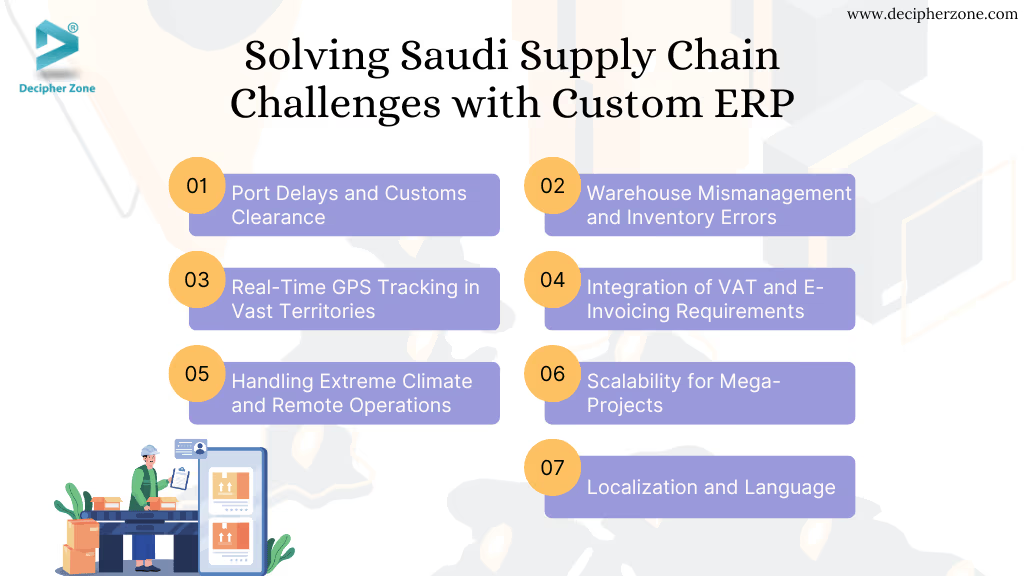
3. Real-Time GPS Tracking in Vast Territories
A hallmark of Saudi logistics is long-haul trucking across vast distances (e.g. Dammam to Jeddah is ~1,300 km). Ensuring timely deliveries and driver safety on these routes is challenging.
Here, an ERP integrated with telematics and GPS devices on trucks provides live tracking and route management. Dispatchers can view each truck’s location on a map via the ERP, receive alerts if a vehicle deviates or stops unexpectedly, and proactively inform customers of delays.
Real-time tracking through IoT sensors also means monitoring truck conditions – e.g. temperature sensors for refrigerated cargo, or engine diagnostics. In practice, if a truck faces an unexpected road closure, the ERP’s transport module can suggest an alternate route and update the ETA.
Such responsiveness was not possible with older systems. By leveraging IoT data within the ERP, companies drastically improve fleet reliability and customer service.
4. Integration of VAT and E-Invoicing Requirements
Saudi Arabia’s tax landscape (15% VAT, electronic invoicing mandates by ZATCA) can trip up logistics companies, especially those dealing with international clients or duty-free zones. A custom ERP can natively handle VAT calculations and electronic invoice compliance.
For example, when a delivery is completed, the ERP automatically generates a VAT invoice in the required format (with all ZATCA-prescribed fields) and transmits it to the tax authority’s portal in real time. It also attaches QR codes and digital signatures on invoices as required. This automation ensures full compliance without burdening staff.
No more manual tax filing headaches – the system produces audit-ready records and helps avoid penalties. Additionally, multi-currency billing (for international routes) and multi-language support (Arabic/English interfaces) can be built-in, reflecting the needs of the Saudi market.
5. Handling Extreme Climate and Remote Operations
The Middle East climate is unforgiving extreme heat can spoil goods or strain vehicles. A custom ERP can integrate with specialized monitoring systems (for cold chain logistics, as an example). If a refrigerated truck’s temperature begins to rise beyond threshold, the IoT sensors trigger an alert in the ERP, and actions (like notifying the driver or dispatching maintenance) can be initiated immediately.
Similarly, for remote routes with spotty connectivity, the ERP’s mobile apps can have offline functionality – storing data locally when offline and syncing when back in network range.
This ensures that field operations continue smoothly even across deserts with poor internet. Standard software might not account for this, but a custom solution can be designed knowing the reality of Saudi geography.
6. Scalability for Mega-Projects
Saudi Arabia is undertaking mega-projects (NEOM city, new ports, etc.) which will massively increase logistics volumes. Logistics providers must be ready to scale. A custom ERP can be architected for scalability e.g., built on cloud infrastructure that auto-scales during peak loads.
When shipping volume doubles during Hajj season or an Amazon-style sale, the ERP can handle the surge. Off-the-shelf solutions sometimes choke under unexpected volume or charge exorbitant fees for scaling; a custom build gives control to the company to plan capacity.
7. Localization and Language
Many global ERP products aren’t fully attuned to local nuances – for example, Hijri calendar integration, Arabic language support, or right-to-left interface layout.
A custom ERP can incorporate these from day one, resulting in software that feels natural for the end-users in Saudi. Drivers or warehouse clerks who prefer Arabic can have screens and printouts in Arabic, while management can switch to English – all in the same system.
🛠️ Need a Logistics ERP That Handles Saudi VAT, E-Invoicing & Local Compliance?
We build software that’s fully aligned with ZATCA and Saudi business regulations.
👉 Hire Experienced ERP Developers
Read: ERP Application Development
Top Features in a Modern Logistics ERP for Saudi Companies
Not all ERPs are created equal – especially when it comes to meeting the needs of modern logistics and supply chain management. Whether a company builds from scratch or customizes an existing platform, certain key features are essential in a logistics-focused ERP for the year 2025 and beyond.
Here are the top features and modules to look for:
1. Transportation Management System (TMS)
The ERP should include robust TMS capabilities. This means route planning and optimization (often AI-powered to minimize distance and fuel), shipment tracking in real time (GPS integration), and freight management tools.
For example, a TMS module can automate carrier selection by comparing rates and performance, then track each shipment’s journey. It might also handle freight billing and auditing, ensuring you’re charged correctly by third-party carriers.
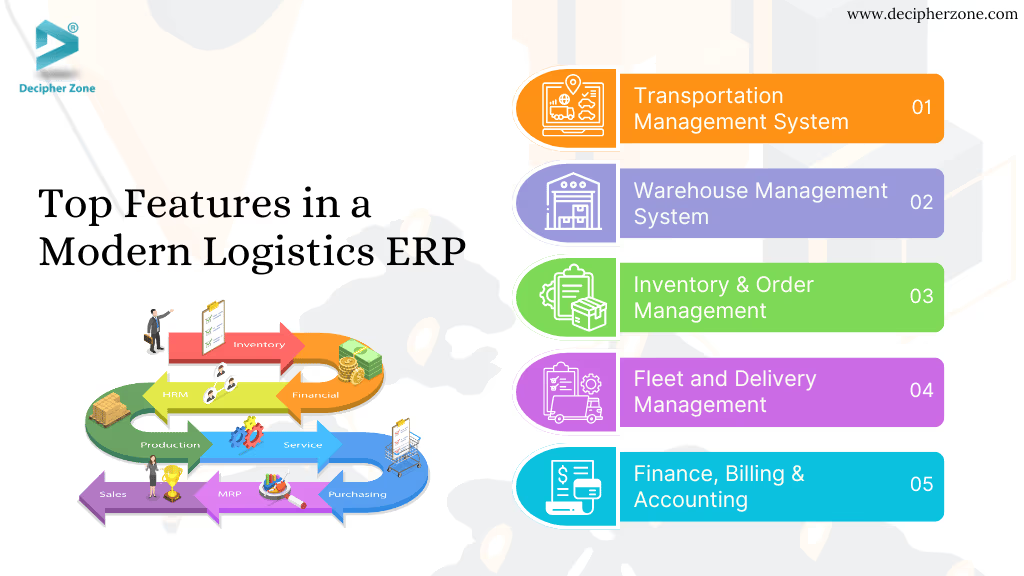
2. Warehouse Management System (WMS)
A modern logistics ERP must excel at warehouse management. Key features include inbound/outbound logistics, inventory control with real-time stock visibility, automated pick/pack/ship workflows, and support for barcode/QR code scanning.
Advanced WMS may use algorithms for slotting (optimizing where goods are stored) and support integration with warehouse automation like conveyors or robots. The goal is to maximize warehouse throughput and accuracy – e.g., the system can generate optimal pick lists or guide workers through the most efficient path in the warehouse when fulfilling orders.
3. Inventory & Order Management
Tied closely to WMS, inventory management features keep track of products across multiple warehouses or fulfillment centers. The ERP should allow setting reorder points, forecasting demand, and balancing inventory between locations.
Order management features ensure that as customer orders come in (from an e-commerce system or manually), the ERP allocates stock, generates picking tasks, and tracks the order through delivery. Real-time inventory tracking and order status updates are crucial for customer satisfaction.
4. Fleet and Delivery Management
For logistics companies operating their own fleet, the ERP should have a fleet management feature. This covers vehicle maintenance scheduling (to reduce breakdowns), driver assignment and payroll, fuel usage tracking, and compliance with transport regulations (like driver working hours).
Also, mobile app integration is key – drivers might use an ERP-connected mobile app to receive delivery tasks, navigate (via integrated maps), capture electronic Proof of Delivery (e.g., customer signature or photo), and report any issues. This data flows back to the ERP instantly.
5. Finance, Billing & Accounting
An often overlooked but critical part of a logistics ERP is the finance module. It should automate billing for shipments or services, apply the correct tariffs or contract rates, and consolidate all financial data.
Features like multi-currency handling are important if you deal with international partners. The ERP should produce P&L statements per route or customer, so you know profitability by segment.
Integration with the company’s general ledger ensures that once an order is delivered, the invoice is sent out and revenue recognized appropriately. Given Saudi Arabia’s VAT system, the finance module must calculate VAT on taxable services and support VAT reporting.
6. Analytics and Business Intelligence
Modern ERPs come with integrated reporting and analytics dashboards. For logistics, this means KPIs like on-time delivery rate, transportation cost per km, warehouse order cycle time, fleet utilization, etc., are readily available.
The ERP should allow creating customized reports and possibly use AI to identify trends (for example, flag that a certain route often suffers delays on Tuesdays, suggesting a need for change).
Real-time analytics help managers make informed decisions on the fly. As one ERP provider notes, analyzing performance data through an ERP’s reporting module guides better decision-making and company growth.
.avif)
7. Real-Time Tracking & IoT Connectivity
We’ve touched on this, but it’s worth listing as a core feature – the ERP should be capable of ingesting real-time data from IoT devices: truck GPS trackers, temperature sensors, RFID gates, etc.
This live data feed enables a truly responsive supply chain. For instance, if a container door opens unexpectedly in transit, the sensor triggers an alert in the ERP which might indicate a security issue. End-to-end visibility from such tracking is what customers and managers expect today.
8. Cloud-Based and Mobile-First
The architecture of a modern ERP should be cloud-based (or at least cloud-ready). Cloud deployment ensures accessibility from anywhere – your teams in Riyadh, Jeddah, or even working remotely can all use the system without performance issues.
It also aids in scaling and ensures updates can be rolled out seamlessly. Additionally, a mobile-friendly design is crucial. Warehouse staff, drivers, and field managers may primarily use tablets or smartphones to access ERP functions. The user interface should be intuitive and optimized for touch and smaller screens, not just desktop browsers.
9. Integration Capabilities (APIs)
No ERP operates in isolation. A logistics ERP must integrate with external systems – examples: e-commerce platforms (to import orders), port authority or customs systems (to exchange shipment data), EDI with large retailers, and mapping services.
Having robust API integration tools or pre-built connectors allows the ERP to fit into the broader IT ecosystem. For Saudi companies, integration with Saudi Customs’ systems, ZATCA’s platform, or local carrier tracking systems can greatly streamline operations.
10. Security and Access Control
Given the sensitive nature of financial and operational data, the ERP should have strong security features. Role-based access control (so, for example, warehouse workers only see inventory screens, not financials), data encryption, and audit logs of who did what are standard expectations.
In the age of cyber threats, features like multi-factor authentication and regular data backups (with disaster recovery plans) are also essential parts of the ERP package.
🌐 Thinking Beyond ERP? We Also Build On-Demand and Web-Based Logistics Platforms
From real-time delivery apps to scalable portals — we’ve got you covered.
👉 Check On-Demand Logistics Solutions
👉 Custom Web App Development
Read: Offshore vs Nearshore
How to Choose the Right Offshore ERP Development Partner
Deciding to go offshore is one thing; selecting the right development partner is another challenge entirely. The success of your ERP project will heavily depend on the team that builds it. Here’s a checklist of criteria and tips for Saudi logistics firms to find an ideal offshore ERP development partner:
1. Relevant Experience and Expertise
Look for a partner with a proven track record in custom software development, ideally with experience in logistics or supply chain projects. Examine their portfolio – have they built similar ERP, WMS, or TMS systems before?
Evaluate the quality of their previous work and see if they have case studies in related industries. An experienced team will understand your needs faster and have ready solutions for common challenges.
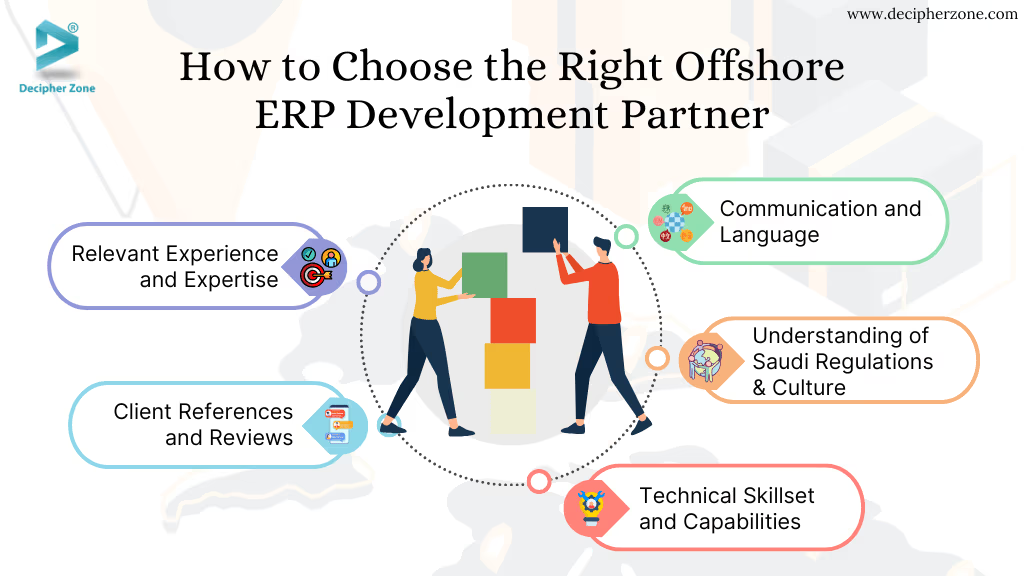
2. Client References and Reviews
Don’t just take the sales pitch at face value. Ask for references from past clients, especially those who did large-scale projects. Check independent reviews on platforms like Clutch or LinkedIn.
Client testimonials and feedback will reveal a lot about the partner’s reliability, communication, and ability to meet deadlines. If a company is hesitant to provide references, consider it a red flag.
3. Technical Skillset and Capabilities
Ensure the partner has expertise in the tech stack you prefer (e.g. Java, .NET, or Python backends; Oracle or MySQL databases; Angular or React frontend, etc.). For an ERP, they should be comfortable with enterprise architecture, integrations (API, EDI), and possibly emerging tech like IoT and AI if you plan to incorporate those.
A quick way to gauge this is by discussing your project’s high-level requirements and seeing if they propose sound technical solutions. The right partner will be able to discuss possibilities like cloud deployment, mobile apps, security measures, and scaling – showing confidence in handling complex, modern systems.
4. Understanding of Saudi Regulations & Culture
Since your ERP must align with Saudi business processes (think VAT, Arabic language, local logistics practices), it helps if the offshore team has some exposure to the Middle East market. Check if they have worked with GCC clients before.
Cultural alignment can significantly smooth out collaboration. For instance, understanding the work week (Sunday-Thursday) differences, or being mindful of local holidays, will improve scheduling. Some Indian firms have onshore coordinators in Saudi or the region – that can be a big plus for face-to-face support when needed.
5. Communication and Language
Effective communication is the lifeline of an offshore project. Ensure the partner’s team leads or project managers are fluent in English (or Arabic, if you prefer – though English is typically the common ground in IT).
Gauge their responsiveness during initial talks – do they answer emails promptly? Are they willing to hold regular video calls? Miscommunication can doom a project, so pick a partner that prioritizes clear, frequent updates. Many top offshore companies will essentially work on your timezone for meetings, adjusting their hours to overlap sufficiently with yours.
6. Development Methodology (Agile vs Waterfall)
In today’s environment, an agile approach is usually preferable for ERP projects. It allows iterative development, giving you prototypes and modules to test along the way, and flexibility to adapt as requirements evolve.
Ask the partner about their process – do they do Scrum sprints with demos? How do they handle change requests? A good partner will have a structured process (daily standups, bi-weekly demos, etc.) but also be flexible and client-focused.
Avoid partners that insist on a very rigid model or don’t involve you until final delivery; collaboration is key, since your feedback throughout will ensure the ERP truly meets needs.
.avif)
7. Quality Assurance and Testing
Quality can make or break an ERP (you don’t want a buggy system disrupting operations). Inquire about the partner’s QA practices. Do they have dedicated testers? What types of testing will be done (unit, integration, performance, security)?
Ask if you can see a test plan or if they follow any QA standards. Top partners will have robust QA, including automated tests for large systems and user acceptance testing cycles with your team’s involvement.
8. Post-Development Support
An ERP isn’t a one-and-done project; you’ll need ongoing support, whether for bug fixes, user training, or adding new features as your business grows. Clarify what happens after go-live.
Do they offer maintenance contracts or on-call support? Will they help with deploying the system on your servers or cloud and ensure everything runs smoothly in real conditions? The right partner stands by you for the long term, not just until delivery.
9. Security and IP Protection
You’ll be sharing sensitive business process details and data with the offshore team. Make sure the company is serious about security. This could mean they’re willing to sign NDAs (Non-Disclosure Agreements) and adhere to IP protection clauses.
Check if they have any security certifications or protocols (like ISO 27001 for information security). Also ensure that the contract clearly states that you will own the source code and intellectual property of the ERP system. This is standard, but it’s good to double-check.
10. Price and Contract Clarity
Finally, while offshore is cheaper, ensure you get a detailed breakdown of costs. Whether it’s a fixed price or time & materials engagement, the partner should be transparent about rates for developers, any one-time fees, etc. Beware of quotes that are unrealistically low – they might be under-scoping the work.
A reputable firm will give a fair quote and timeline, and be willing to tie payments to milestones (so you pay as you see progress). Ensure there’s a written contract that covers all terms including delivery schedule, acceptance criteria, and remedies if things go off track.
Read: Managing Offshore Teams from the U.S.
Final Thoughts
As Saudi Arabia’s logistics sector races toward a high-tech, globally integrated future, investing in a custom ERP system is becoming not just beneficial, but essential. The complexity of modern supply chains, coupled with the Kingdom’s unique operational challenges, calls for software that fits like a glove.
Building such systems offshore has emerged as a strategic win-win: it delivers the bespoke functionality and innovation that logistics companies need, while keeping costs under control and timelines accelerated.
💡 Want to See What We’ve Built for Global Clients?
Take a look at our portfolio of logistics, ERP, and enterprise-grade platforms.
👉 View Case Studies and Projects
Offshore ERP development is far more than a cost-cutting tactic – it’s about leveraging global expertise to future-proof your business. By tapping into world-class developers abroad, Saudi logistics firms can incorporate advanced features (AI, IoT, blockchain, you name it) that set them apart from competitors.
They also instill a culture of agility, learning from the best practices of seasoned software teams. Over time, the partnership with the right offshore provider can evolve into a long-term asset, continually evolving the ERP as the business grows (be it new service lines, larger volumes, or regional expansion).
Of course, success requires due diligence. It’s crucial to choose an offshore partner with care, clearly communicate requirements, and remain involved throughout development.
As we discussed, the rewards are immense: 40–60% cost savings, faster deployment, and a custom ERP that exactly maps to your processes. The case study of Riyadh FreightCo illustrated how one company halved its ERP budget and reaped efficiency gains by working with an offshore team.
In the end, the decision to go offshore should align with a larger vision: positioning your logistics company for the future of supply chain management. That future in Saudi Arabia looks digital, data-driven, and highly integrated from port to warehouse to customer.
Offshore-built ERPs are a means to that end – enabling even mid-sized players to punch above their weight with technology that rivals what global giants have.
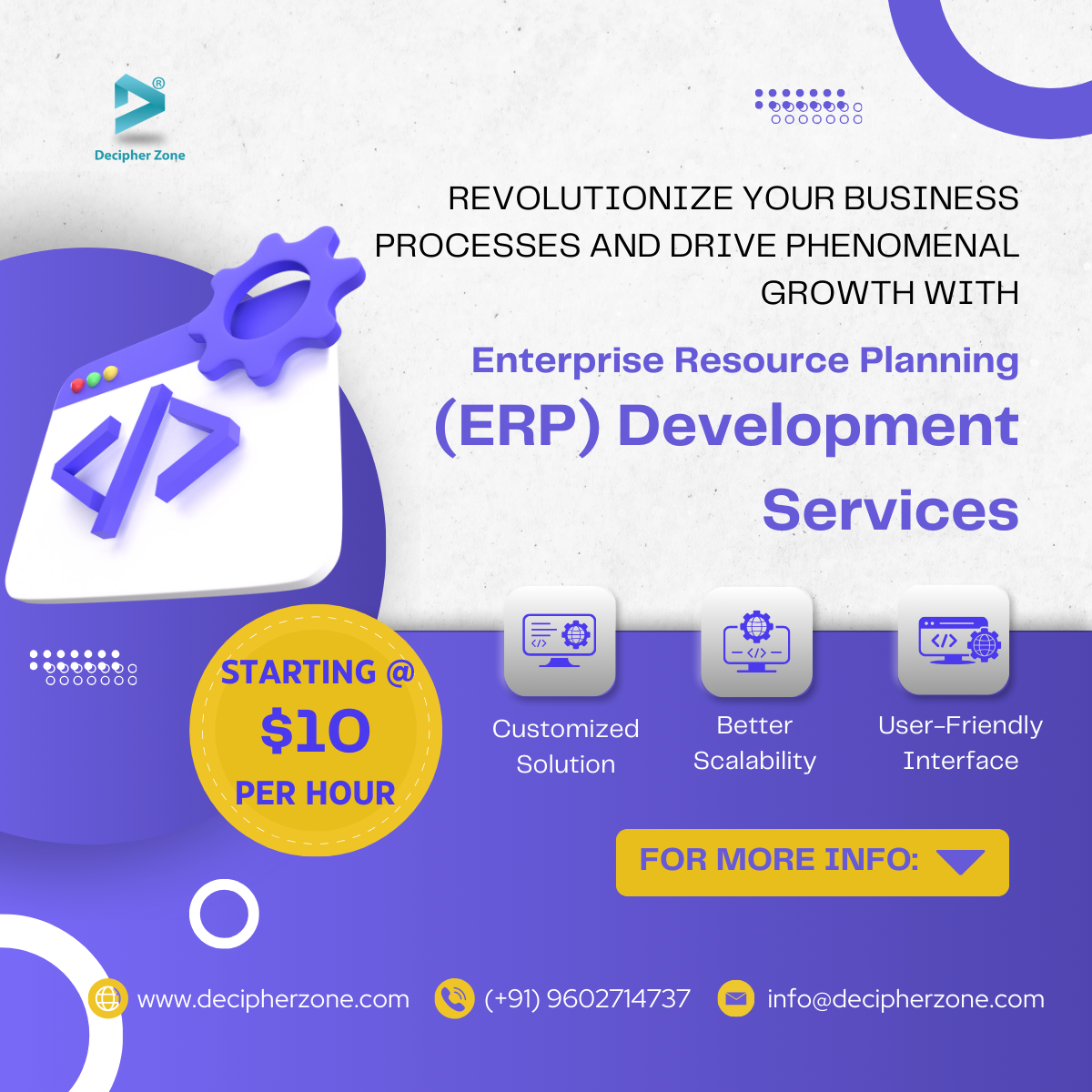
For executives weighing this move, the advice is to think big but start smart. Define your goals for digitization, get buy-in from your team (change management is important when new systems roll out), and engage a partner like Decipher Zone who can translate your vision into a robust software reality.
With careful execution, an offshore-developed ERP will not only cut costs – it will become the backbone of your logistics operations, driving excellence every day.
In conclusion, offshoring your ERP development is not just about cutting a check for cheaper coding; it’s a strategic step toward innovation and resilience. Saudi logistics firms that embrace this approach today will likely be the frontrunners of tomorrow’s marketplace – more agile, efficient, and ready to capitalize on the Kingdom’s growing role as a global logistics hub.
📲 Need Mobile ERP or Tracking App for Drivers and Fleet?
We build Android and iOS apps tailored for field logistics and supply chain operations.
👉 Mobile App Development Services
FAQs
What is the cost of ERP development for logistics companies in Saudi Arabia?
Answer: ERP development in Saudi Arabia for logistics firms can cost between SAR 750,000 to 1,500,000 ($200k–$400k), depending on project size, features, and local developer rates. Offshore development (e.g., from India) can reduce this cost by 40–60%, offering high-quality custom ERP solutions at a more affordable rate.
Why are Saudi logistics companies outsourcing ERP development offshore?
Answer: Saudi logistics companies are outsourcing ERP development offshore to reduce costs, access specialized talent, and speed up development. Offshore teams offer scalable, flexible, and expert ERP services — often at half the local cost — while still delivering real-time tracking, warehouse automation, and compliance features tailored for Saudi supply chains.
What are the key benefits of offshore ERP development?
Answer: Offshore ERP development offers:
-
40–60% lower development costs
-
Faster delivery timelines
-
Access to niche logistics tech expertise
-
Full customization flexibility
-
24/7 support and scalability
How does a custom ERP system help Saudi logistics companies?
Answer: A custom ERP system helps Saudi logistics companies by enabling:
-
Real-time GPS and fleet tracking
-
Warehouse and inventory automation
-
Integration with ZATCA VAT and e-invoicing
-
Multilingual (Arabic/English) interfaces
-
Adaptability to Saudi regulations and climate
What features should a logistics ERP have in 2025?
Answer: A modern logistics ERP in 2025 should include:
-
TMS and WMS modules
-
IoT-based real-time tracking
-
AI-powered route optimization
-
Cloud and mobile-first architecture
-
Multi-currency, VAT, and compliance support
-
Analytics dashboards and API integrations
Is offshore ERP development suitable for Saudi Vision 2030 goals?
Answer: Yes, offshore ERP development aligns well with Saudi Vision 2030 goals by accelerating digital transformation in logistics, enabling smarter infrastructure, cost-effective scaling, and global competitiveness — all vital for making Saudi Arabia a global logistics hub.
👨💻 Hire Skilled Full-Stack Developers for Your Logistics Software Project
Scale your ERP faster with dedicated talent in Java, ReactJS, Node.js, and more.
👉 Hire Full-Stack Developers
👉 Hire ReactJS Developers
👉 Hire Java Developers
🤝 Partner With Us to Accelerate Your Digital Logistics Transformation
Join our global partner network to co-build innovative ERP solutions for the Gulf region.
👉 Become a Partner
💬 Prefer WhatsApp? Let’s Chat About Your ERP Project Now
Fast-track your development needs — we’re just a message away.
👉 Chat on WhatsApp
Author Profile: Mahipal Nehra is the Digital Marketing Manager at Decipher Zone Technologies, specializing in SEO, content strategy, and tech-driven marketing for software development and digital transformation.
Follow us on LinkedIn or explore more insights at Decipher Zone.

